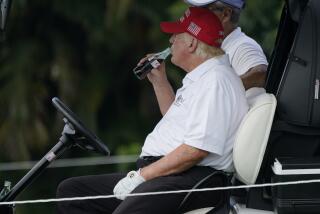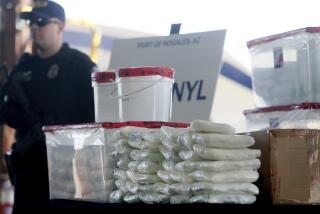‘90s FAMILY : Tell Kids the Sober Truth on Drug Past
“Did you take drugs when you were a kid?”
It’s a question unique to this generation of children and parents. Maybe, like many baby boomers, you tried marijuana in the 1960s and ‘70s.
Maybe you gave it up as you matured. Or not.
Still, you have a variety of concerns for your children: Marijuana is more potent now and kids are tempted to try it at younger ages. They might get addicted or arrested. Drug-related short-term memory loss might threaten their academic success. If they try LSD, they might experience permanent vision problems. And on and on.
So, you want to do the right thing, you want to set an example, and you don’t know whether to lie, tell the whole truth and nothing but the truth or something in between.
Victor Strasburger, author of “Getting Your Kids to say ‘No’ in the ‘90s When You Said ‘Yes’ in the ‘60s,” recommends “something in between.”
Lying doesn’t work, the Albuquerque pediatrician said, because children have built in lie detectors and can spot parents lying just as swiftly as parents can spot them. The complete truth is also a risk for those with a long list of gory details to relate.
Kids can either learn from parents’ mistakes, or say to themselves, “If mom and dad did that, why shouldn’t I?”
*
One San Francisco father--a successful computer software entrepreneur--had dropped acid at the Fillmore in the ‘60s and decided that he did not want his son to do the same. But when he told him, the son replied: “You used it and you’re a success. What’s wrong with me doing it?” The son did understand, however, that he would be expelled from his private school for drug use.
“There seems to be a phenomenon of generational forgetting. Young people have to relearn the lessons of the ‘60s all over again,” said David Smith, founder and director of the Haight Ashbury Free Clinic. To show them just how bad acid trips can get, he periodically takes teen-agers to rock concerts with his medical unit.
Strasburger said what parents need to remember when confronting the truth of their youthful past is that kids are not snooping, nor trying to make them hypocrites when they ask about their sexual or drug past.
“They’re asking for advice about what they should do. That’s the question you should primarily respond to.”
Much depends on the parents’ basic relationship with the child, begun years earlier, and their pursuit of ongoing, honest communication (within limits), he said.
Needless to say, parents who use drugs have zero credibility in trying to dissuade their children from using. On the other hand, some parents are resigned to their children’s youthful experimentation with substances.
*
One mother, a 38-year-old postal worker who has gradually stopped using the drugs she took in her 20s, believes that fear-based prevention programs only serve to make children more curious about drugs. She said she tried a more sincere version of her own parents’ line; i.e. “If you’re going to do it, do it here at home,” but found that it backfired with her 18-year-old son.
A few weeks ago, she found him growing five plants at home. “He was going to do it for his own personal use so that he would not have to buy any more, which really made sense to me,” she said. “Then I went, wait a second. It’s against the law.” Almost all his friends knew. Any one of them might inform on him for any number of reasons.
She cut down the plants and instituted a new house rule: No growing allowed.
Parents do not have to feel like hypocrites for asking their children to do as they say, not as they did, Strasburger said. Perhaps for the first time in history, parents can get away with telling their children that times have changed--because they have.
At the same time, it’s not necessary to go overboard if kids experiment once with marijuana, Strasburger said. “As a pediatrician, I have to tell parents that the single deadliest drug by far, overwhelmingly, is alcohol, and that’s the drug you need to worry about.”
More to Read
Sign up for Essential California
The most important California stories and recommendations in your inbox every morning.
You may occasionally receive promotional content from the Los Angeles Times.










